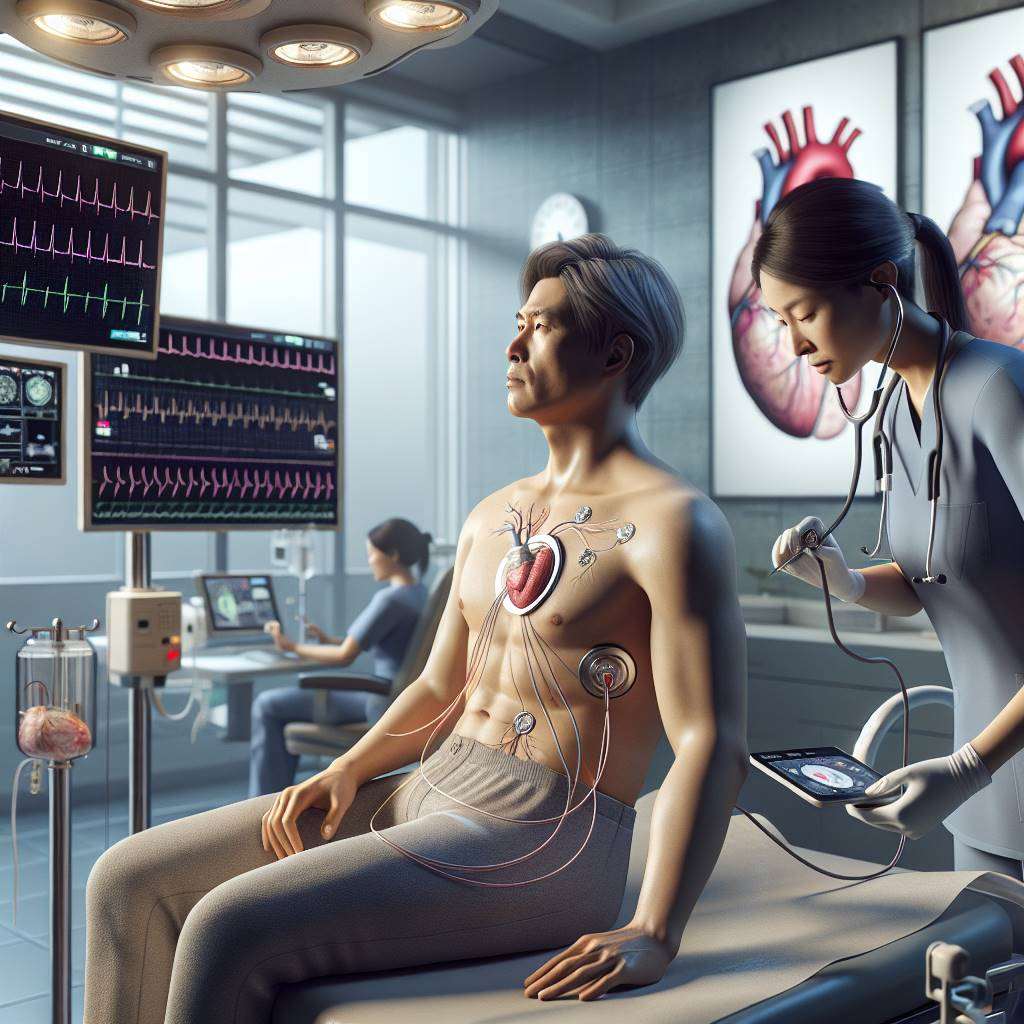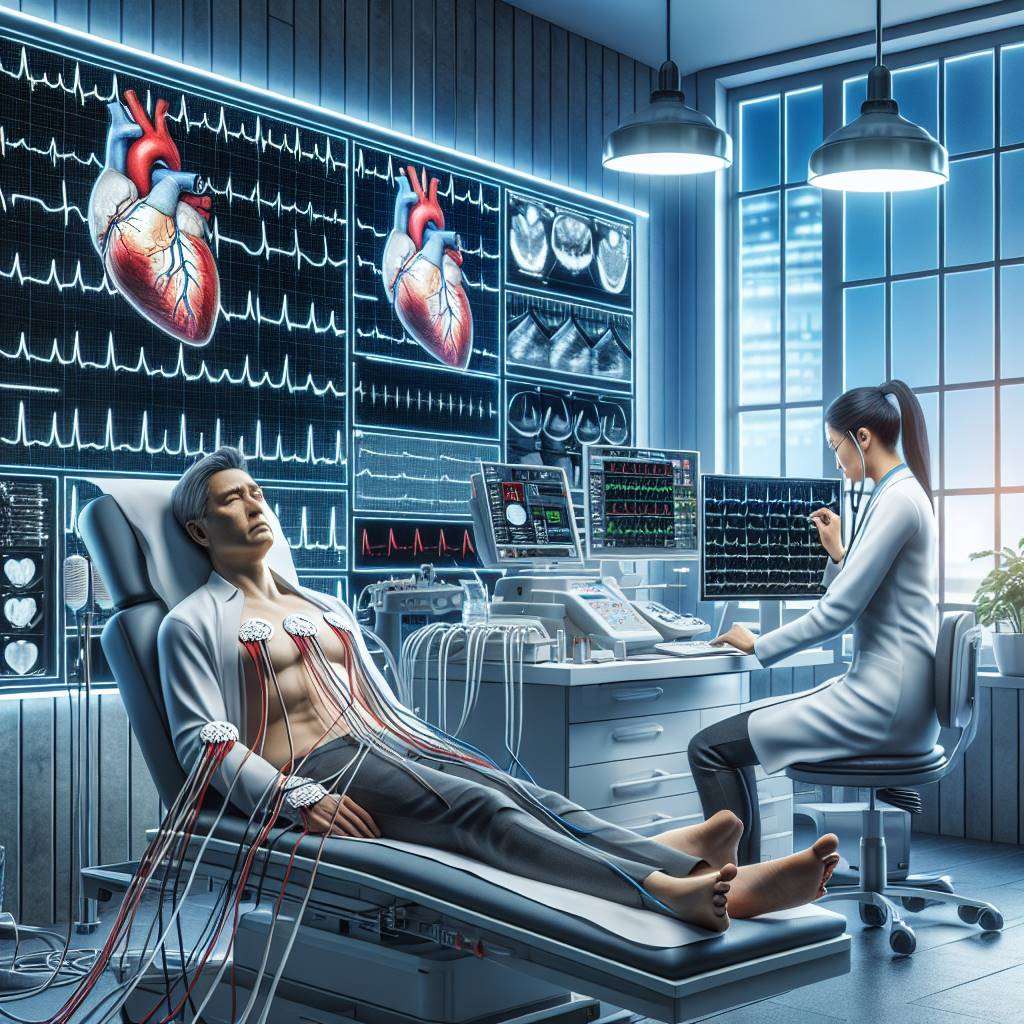An Automatic Implantable Cardioverter Defibrillator (AICD) is a life-saving device for patients with severe heart conditions. Regular AICD check-ups are essential to ensure the device is functioning correctly and to monitor the patient’s heart health. These follow-ups help detect any issues early, providing peace of mind and improving long-term outcomes.
Medical disclaimer: This content is for general awareness and does not replace a doctor’s consultation. For diagnosis or treatment decisions, consult a qualified specialist.
Understanding the AICD follow-up process is crucial for patients and caregivers. These appointments involve device testing, heart rhythm monitoring, and adjustments if needed. Regular check-ups not only maintain the device’s performance but also help prevent complications, ensuring the patient’s overall well-being and quality of life.
What to Expect During an AICD Check-Up
During an AICD check-up, your doctor will evaluate both the device and your heart’s condition. The process typically begins with a review of your medical history and any symptoms you may have experienced since your last visit. This helps the doctor understand how well the device is supporting your heart health.
The doctor will use a specialized programmer to communicate with the AICD. This allows them to check the device’s battery life, leads, and stored data. Any irregularities in your heart rhythm or device performance will be identified during this step. Adjustments to the device’s settings may also be made to optimize its function.
Patients may also undergo an ECG (Electrocardiogram) or other tests to assess their heart’s activity. These evaluations ensure that the AICD is effectively preventing life-threatening arrhythmias and providing the necessary support.

Understanding the Purpose of Regular AICD Follow-Ups
Regular AICD follow-ups are vital for maintaining the device’s functionality and ensuring your heart remains protected. These appointments allow doctors to monitor the device’s battery, leads, and overall performance. Since the AICD is designed to detect and treat abnormal heart rhythms, ensuring its accuracy is critical.
Follow-ups also provide an opportunity to address any symptoms or concerns you may have. For instance, if you’ve experienced dizziness, fainting, or palpitations, your doctor can investigate whether these are related to your heart condition or the device itself. Early detection of issues can prevent complications and improve outcomes.
Additionally, these check-ups help in planning for future care, such as scheduling a battery replacement or upgrading the device if necessary. By attending regular follow-ups, patients can ensure their heart health remains stable and well-managed.
How Doctors Monitor Your AICD Device Function
Doctors use advanced tools to monitor your AICD device during follow-ups. A programmer is used to communicate with the device, allowing the doctor to retrieve data about your heart’s activity and the device’s performance. This data includes information on any arrhythmias detected and treated by the AICD.
The device’s battery life and lead integrity are also checked. Leads are the wires that connect the AICD to your heart, and their proper functioning is crucial for the device to work effectively. If any issues are detected, the doctor may recommend further tests or interventions.
- Battery status: Ensures the device has sufficient power.
- Lead performance: Checks for any damage or disconnection.
- Stored data: Reviews episodes of arrhythmias and device responses.
By closely monitoring these aspects, doctors can ensure that your AICD continues to provide reliable protection against life-threatening heart conditions.
Steps Involved in a Routine AICD Check-Up
A routine AICD check-up involves several steps to ensure the device is functioning optimally. First, your doctor will discuss any symptoms or changes in your health since the last visit. This helps identify potential issues that may require attention.
Next, the doctor will use a programmer to test the device. This includes checking the battery, leads, and stored data. If necessary, adjustments to the device’s settings will be made to improve its performance. Additional tests, such as an ECG, may also be conducted to evaluate your heart’s activity.
Finally, the doctor will provide recommendations for ongoing care, including lifestyle changes or medication adjustments. These steps ensure that your AICD continues to protect your heart effectively and that you remain in good health.
Why AICD Follow-Ups Are Crucial for Heart Health
Regular AICD follow-ups are essential for maintaining your heart health and preventing complications. These appointments allow doctors to detect and address any issues with the device or your heart’s condition early, ensuring optimal protection against life-threatening arrhythmias.
Missing follow-ups can lead to undetected problems, such as a depleted battery or malfunctioning leads. These issues could compromise the device’s ability to respond to abnormal heart rhythms. By attending regular check-ups, you can avoid such risks and ensure your heart condition remains well-managed.
Additionally, follow-ups provide an opportunity to discuss any concerns or symptoms with your doctor. This collaborative approach helps in tailoring your care plan to meet your specific needs, improving your overall quality of life and long-term outcomes.
Common Tests Performed During an AICD Evaluation
During an AICD (Automated Implantable Cardioverter Defibrillator) check-up, several tests are conducted to ensure the device is functioning correctly. These tests help monitor the health of your heart and the performance of the device. One of the most common tests is the interrogation of the AICD, where a special programmer communicates with the device to retrieve data about its activity and battery status.
Additionally, your doctor may perform an ECG (Electrocardiogram) to assess your heart's rhythm and electrical activity. In some cases, a threshold test is conducted to determine the minimum amount of energy the AICD needs to deliver a shock effectively. These tests are painless and provide critical insights into your heart health and device performance.

How AICD Settings Are Adjusted During Check-Ups
During an AICD check-up, the device's settings may be adjusted to ensure optimal performance. The programmer, a specialized device used by your doctor, communicates with the AICD to review its current settings and make necessary changes. These adjustments are tailored to your specific heart condition and medical needs.
For example, the sensitivity of the AICD to detect abnormal heart rhythms can be fine-tuned. The energy level of shocks delivered by the device may also be modified to ensure they are effective but not excessive. These adjustments are crucial for managing conditions like ventricular tachycardia or atrial fibrillation. Your doctor will explain any changes made and how they benefit your overall heart health.
Signs Your AICD May Need Reprogramming
It’s important to recognize signs that your AICD may require reprogramming. One common indicator is experiencing frequent or unnecessary shocks, which could mean the device is too sensitive. Similarly, if you feel lightheaded or notice a sudden increase in palpitations, it might indicate the AICD is not detecting arrhythmias correctly.
Other signs include unusual fatigue, chest discomfort, or a noticeable change in your heart rhythm. If you experience any of these symptoms, contact your doctor immediately. Regular check-ups help identify these issues early, but being aware of these signs ensures timely intervention. Always keep a record of any symptoms to discuss with your healthcare provider during your next visit.
- Frequent or unnecessary shocks
- Lightheadedness or dizziness
- Increased palpitations
- Unusual fatigue or chest discomfort
What Happens If Your AICD Shows Irregularities?
If your AICD shows irregularities during a check-up, your doctor will take immediate steps to address the issue. The first step is to identify the cause of the irregularity, which could be related to the device settings, battery life, or your heart's condition. The AICD programmer is used to retrieve detailed data from the device for analysis.
Depending on the findings, your doctor may reprogram the device, replace the battery, or recommend further tests like an echocardiogram. In rare cases, if the device is malfunctioning, a replacement procedure may be necessary. Addressing these irregularities promptly ensures your heart remains protected and reduces the risk of complications.
How Long Does an AICD Check-Up Typically Take?
An AICD check-up is usually a quick and straightforward process. On average, the appointment lasts about 30 to 60 minutes. The duration depends on the complexity of the tests performed and whether any adjustments to the device are required.
During the visit, your doctor will review your medical history, perform tests like device interrogation, and discuss any symptoms you may have experienced. If reprogramming or additional tests are needed, the appointment may take slightly longer. Regular check-ups are essential for maintaining the functionality of your AICD and ensuring your heart health is well-managed.
| Procedure |
Time Required |
| Device Interrogation |
10–15 minutes |
| ECG |
5–10 minutes |
| Reprogramming (if needed) |
15–20 minutes |
Preparing for Your Next AICD Follow-Up Appointment
Preparing for an AICD (Automatic Implantable Cardioverter Defibrillator) follow-up is essential for maintaining your heart health. Before your appointment, ensure you have a list of any recent symptoms, such as dizziness, chest pain, or palpitations, to discuss with your doctor.
Bring a list of all medications you are currently taking, including dosages. This helps your healthcare provider ensure there are no interactions with your AICD. If you have experienced any electrical shocks from your device, note the date and circumstances to share during the visit.
Wear comfortable clothing, as your doctor may need to access the area around your device. Being prepared ensures a smoother and more productive check-up, allowing your doctor to assess your device’s performance and your overall heart health effectively.

Can AICD Check-Ups Detect Other Heart Problems?
An AICD check-up not only monitors the device but can also provide insights into other potential heart conditions. During the visit, your doctor evaluates the device’s data, which records irregular heart rhythms, such as atrial fibrillation or ventricular tachycardia.
These insights can help detect conditions like worsening heart failure or arrhythmias that may require additional treatment. If the device shows frequent activations, it could indicate an underlying issue that needs further investigation, such as coronary artery disease or electrolyte imbalances.
While the primary focus is on the AICD, these check-ups often serve as a broader assessment of your cardiovascular health, ensuring early detection and timely intervention for other heart-related problems.
What Patients Should Ask During an AICD Check-Up
Asking the right questions during your AICD follow-up can help you better understand your condition and device. Start by asking about the performance of your device: “Is my AICD functioning as expected?” or “Have there been any abnormal readings?”
Inquire about your overall heart health, including whether there are any signs of worsening conditions. If you’ve experienced symptoms like fatigue or shortness of breath, ask if these could be related to your heart or device.
- “Do I need any changes to my medications?”
- “Are there any lifestyle adjustments I should consider?”
- “When should I schedule my next follow-up?”
These questions ensure you stay informed and proactive about your heart health and AICD management.
How Often Should You Schedule AICD Follow-Ups?
The frequency of AICD follow-ups depends on your specific condition and the type of device you have. Typically, patients are advised to visit their doctor every 3 to 6 months for routine check-ups. However, some may require more frequent visits, especially if they’ve experienced recent symptoms or device activations.
During these appointments, your doctor will check the battery life, assess the device’s performance, and review any recorded data. If your device is nearing the end of its battery life, follow-ups may become more frequent to plan for replacement.
Always follow your doctor’s recommendations for scheduling, as regular monitoring is crucial for ensuring your AICD continues to protect you effectively against life-threatening arrhythmias.
Latest Advances in AICD Monitoring Technology
Recent advancements in AICD technology have significantly improved patient care. Modern devices now feature remote monitoring capabilities, allowing doctors to track your heart health and device performance in real-time without requiring frequent in-person visits.
Some AICDs are equipped with advanced algorithms that can predict potential arrhythmias before they occur, enabling earlier intervention. Additionally, newer models have longer battery lives and improved shock delivery systems, reducing patient discomfort during activations.
| Feature |
Benefit |
| Remote Monitoring |
Convenient tracking from home |
| Predictive Algorithms |
Early detection of arrhythmias |
| Longer Battery Life |
Fewer replacements needed |
These innovations ensure better outcomes and a more comfortable experience for patients relying on AICDs.
Best Aicd Implantation Doctors in India
Two of the most reputed doctors for AICD treatment in India are Dr. Balbir Singh, Chairman of Cardiology at Max Super Speciality Hospital, Delhi, with over 30 years of experience, and Dr. Naresh Trehan, Chairman and Managing Director of Medanta - The Medicity, Gurugram, with international recognition and over 40 years of expertise. Both are renowned for their excellence in electrophysiology and cardiac care.
Learn more on best aicd implantation doctors in india
Best Aicd Implantation Hospitals in India
Leading hospitals for AICD treatment in India include Fortis Escorts Heart Institute, Delhi, known for its advanced cardiac electrophysiology labs and multidisciplinary care, and Apollo Hospitals, Chennai, a JCI-accredited facility with a strong focus on international patient services and cutting-edge technology. Both hospitals have a track record of successful outcomes in cardiac device implantation.
Find more best aicd implantation hospitals in india
Aicd Implantation Cost in India
The cost of AICD treatment in India typically ranges from INR 5,00,000 to INR 12,00,000 (approximately USD 6,000 to USD 15,000). Factors influencing the cost include the doctor’s expertise, hospital infrastructure, and device type. The average hospital stay is 3-5 days. India offers a significant cost advantage compared to Western countries, with options for insurance coverage and third-party financing.
Learn aicd implantation cost in india
Aicd Implantation Treatment in India
AICD implantation in India involves pre-procedure evaluations, device placement under local or general anesthesia, and post-implantation testing. Advanced technologies like 3D mapping and minimally invasive techniques are commonly used. Recovery typically takes 1-2 weeks. Top hospitals in India adhere to global medical standards and frequently adopt innovative practices for better outcomes.
Learn on Aicd Implantation Treatment in India
FAQs
What is an AICD?
An AICD (Automated Implantable Cardioverter Defibrillator) is a small device implanted in the chest to monitor and correct abnormal heart rhythms, preventing sudden cardiac arrest.
How often should an AICD be checked?
An AICD should be checked every 3-6 months, or as advised by your cardiologist, to ensure it is functioning properly and to monitor battery life.
Is the AICD check-up painful?
No, an AICD check-up is a non-invasive procedure and is typically painless. It involves using a programmer to communicate with the device wirelessly.
What happens if the AICD battery is low?
If the AICD battery is low, your doctor will schedule a replacement procedure. The device will continue to function safely until the replacement is performed.
Can I travel with an AICD?
Yes, you can travel with an AICD. However, it is recommended to carry your device identification card and inform airport security about the device.
Are there any restrictions after AICD implantation?
After AICD implantation, you may need to avoid heavy lifting, strenuous activities, and certain electronic devices that can interfere with the device.
How long does an AICD last?
The lifespan of an AICD typically ranges from 5 to 10 years, depending on the device type and usage. Regular check-ups help monitor its performance.
What are the risks of AICD implantation?
Risks of AICD implantation include infection, bleeding, or device malfunction. However, these risks are rare and can be managed effectively by experienced doctors.
Can an AICD cure heart conditions?
An AICD does not cure heart conditions but helps manage life-threatening arrhythmias by delivering shocks or pacing the heart when needed.
What should I do if my AICD delivers a shock?
If your AICD delivers a shock, contact your doctor immediately. If you experience multiple shocks or feel unwell, seek emergency medical care.
Understanding the Role of AICD in Heart Health
An Automated Implantable Cardioverter Defibrillator (AICD) is a crucial device for patients with heart failure, significantly enhancing their chances of survival. By monitoring heart rhythms and delivering shocks when necessary, AICDs can prevent life-threatening arrhythmias. For a deeper understanding of how AICDs improve survival rates among heart failure patients, check out our detailed blog on AICD for Heart Failure Patients: How It Improves Survival.
Moreover, AICDs play a vital role in preventing sudden cardiac death, a leading cause of mortality in at-risk populations. The data surrounding their effectiveness is compelling, showcasing their ability to save lives. To explore the research and statistics behind this life-saving technology, read our insightful article on Can an AICD Prevent Sudden Cardiac Death? Here's What the Data Says.
In summary, AICDs are essential for managing severe heart conditions, providing both immediate and long-term benefits to patients. Understanding their function and efficacy can empower patients and families in making informed health decisions.